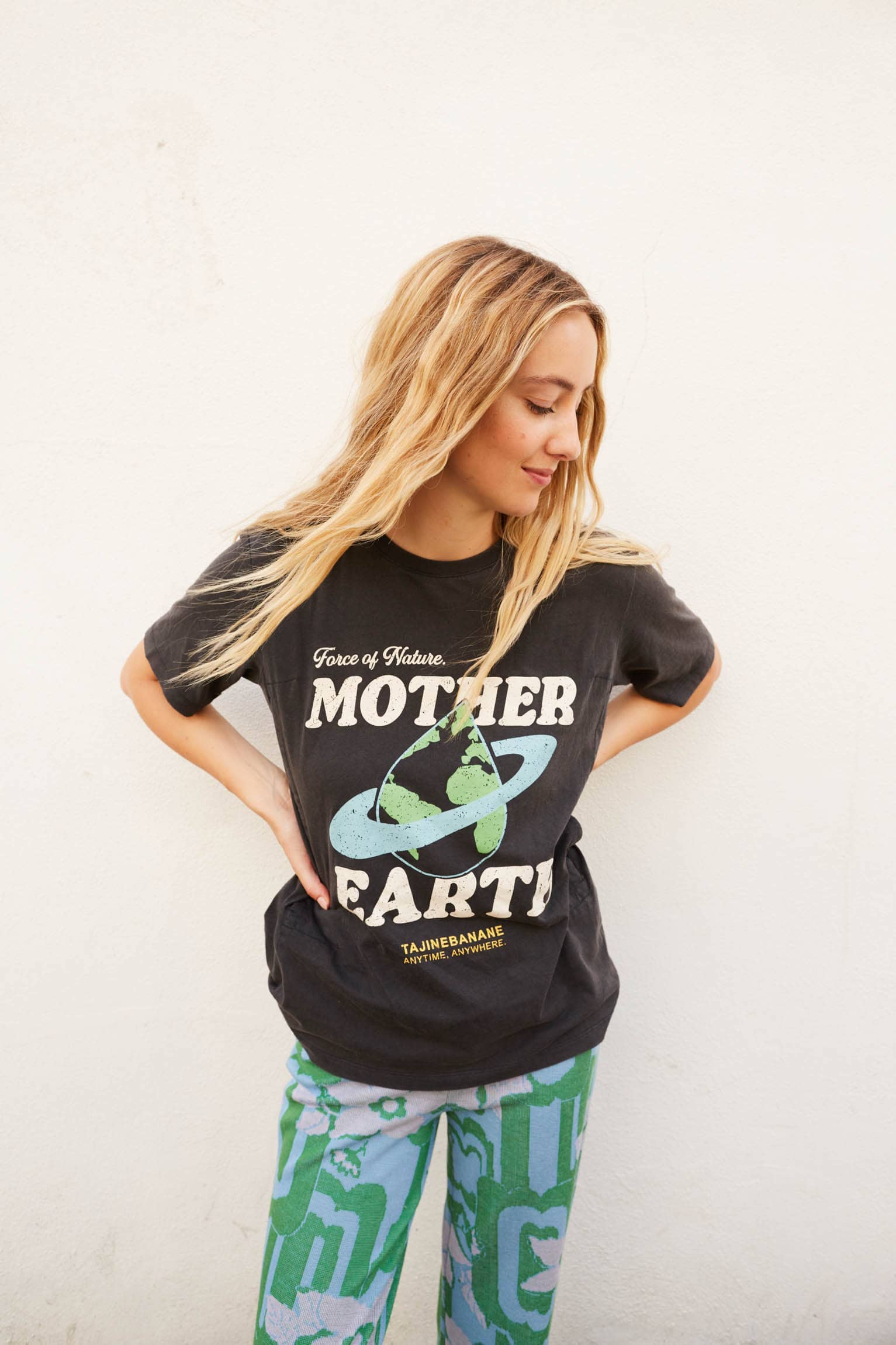Some time ago, we received a testimony from a mother in the Tajinebanane fam' that made a deep impression on us. She shared with us her distress, noting that she was losing a lot of weight while breastfeeding: 13 months after giving birth, she was 10kg below her ideal weight. Most people and moms around her often told her that she was "so lucky". Not according to her.
One of our first reflexions about sharing her story was to think: "what will those who are struggling to lose the pounds of their pregnancy think?" But we quickly rejected this notion, saying to ourselves that each person has their own history, everyone has their own experience, each one a different relationship with their body.
What is the relationship between breastfeeding and weight loss?
Studies are relatively conclusive: in the medium term and without any particular diet, women who breastfeed generally return to their normal weight more easily than those who do not breastfeed. But if breastfeeding favors a faster loss of fat, by drawing on the reserves created for this purpose, it should not be decisive in your choice to breastfeed. Especially since each body reacts differently: some breastfeeding mothers have even gained weight after breastfeeding their child. It's a question of metabolism.


"I’m on the “generous postpartum” team: I gained about 10 kilos during the pregnancy of my daughter Maali (9 years old) that I lost very quickly when I gave birth. 18 months of breastfeeding later, I gained 10 kilos back. I must admit that I was a little unhappy about this, especially when it seemed to be the opposite for others... But once my daughter was weaned, I already began to be less hungry and the weight went away in 3 or 4 months without too much effort!
For my son Lou (3 ½ years old) who I breastfed for 2 years, I also saw a +10 on the scale. I don’t know if it’s the rhythm of my professional life, the 3 kids (and the less accommodating body), or a pressure I don’t put on myself anymore, but those 10 kgs are still quietly lodged. And even though I went from M to XL at TB in the space of two years, I also know that my body has accomplished so much that I’m not in a hurry to ask it to work hard to fit into my jeans again."
Listen to us/yourself: your body has just carried life for 9 months, sending stomach, liver and other intestines in all directions. All of this is punctuated by a magnificent but trying effort, more commonly called childbirth. It takes about a year for your body to recover from all the changes induced by pregnancy. And if you go past that point without losing the weight you were hoping for, that's okay.
What if you want to go on a "diet"?
For breastfeeding moms, how can a (healthy) diet or weight loss affect breastfeeding and your lactation?
Although the concentration of certain nutrients may vary depending on the mother's intake (especially certain fats, vitamins and minerals), breast milk will always be suitable for the baby. Most of its components remain stable regardless of diet (proteins, carbohydrates, certain fats and vitamins), even if this is sometimes at the expense of the mother's body reserves.
A mantra that needs to be repeated, that we read in a Jolly Mama article:
"A diet that is good for pregnant and breastfeeding women is exactly the same as one that is good for everyone else: varied, balanced, composed of foods that are as natural as possible!"
(French article source : Peut-on manger de tout quand on allaite ? Mythes et réalités de l’alimentation durant l’allaitement )
The Leche League website, unfortunately only available in French, also shares some relevant thoughts on the subject:
As long as you follow a few rules of caution, weight loss will not cause a decrease in milk secretion or a significant release of toxins.
These rules are:
⏰ Wait two to three months after giving birth, so that the body has recovered from the pregnancy and breastfeeding is well underway.
🪄Avoid commercial diets (and their big promises), which are completely unbalanced nutritionally and bad for everyone, especially for nursing mothers.
🥬 Preferably find a balanced diet, with a reduction of fats and fast sugars, and a good ratio of fruits and vegetables. Do not hesitate to consult a dietician, who will be able to develop a diet adapted to each case and taking into account eating habits, allowing you to lose weight gently without being hungry.
📉 Do not try to lose more than 2 to 3 kg per month.
🧘🏽♀️ Exercise two or three times a week (a good walk, a session of gymnastics or swimming, a short jog...) which also helps a lot with morale!
💡 Nb: Resuming sports is not suitable without medical advice (especially for perineal rehabilitation). Consult your general practitioner, midwife or other specialist before resuming regular physical activity.
💡 Note de la team TB: Check out the breastfeeding-friendly recipes on the Jolly Mama blog, each one more tempting (and healthy) than the last... like the snacks the brand offers!
The last piece of advice is ours: be gentle with yourself.
Postpartum Nutrition:
We will start by reminding mothers, breastfeeding or not, that a drastic diet will have no positive long-term effect: neither on your body, nor on your morale. This advice is often repeated but it is sometimes difficult to take onboard, as we want to see results quickly: the efforts have to be made in the long term and made naturally. Listen to your hunger, do not snack between meals and follow the rules given by the experts (see below for examples).
Boob news: part of integrating a balanced regime means that we should not have to prevent ourselves from having a square of chocolate from time to time...
"During the first months, the priorities remain the same, you need a vitalising diet, which will help you to regain energy and adopt a new rhythm" Julia Simon
In her book "Living Well in the 4th Trimester", Julia shares her recommendations for a healthy, rejuvenating postpartum diet that will help you get back on track without going too fast:
🙅🏼♀️ Avoid: any food that will be inflammatory or considered exciting and that could disrupt your already fragile hormonal balance: alcohol, refined sugar (candy, industrialized cakes...), coffee and black tea, foods and drinks consumed cold
💆🏻♀️ Prefer: hot dishes (broth, soup, curry, stews...) and herbal teas.
🙅🏼♀️ Avoid: big raw salads, low in calories but hard to digest.
💆🏻♀️ Prefer: foods rich in nutrients and easy to digest (eggs, fish, lentils, root vegetables, dates, avocado...). Cold-preserved juices (consumed at room temperature), cooked vegetables and fruits also promote transit, sometimes disrupted after childbirth.
We share with you some balanced recipes from Julia Simon's book:

* Find all these recipes (and more) in Julia Simon's book.
And here is her guide to boosting your immunity through diet. Both are in French.
Sources:
- La Leche League - https://www.lllfrance.org/vous-informer/fonds-documentaire/allaiter-aujourd-hui-extraits/1167-55-regime-et-allaitement-aa55
- Julia Simon, naturopath - Her book "Bien vivre le 4e trimestre au naturel" (Living the 4th trimester naturally) provides many solutions to recover emotionally and physically after pregnancy.
- Jolly mama - We tested (and loved) their healthy and natural snacks, ideal for pregnant and nursing women.
Bonus: their blog is one of our favorites, as it is full of good advice and informative testimonies about motherhood in general.












